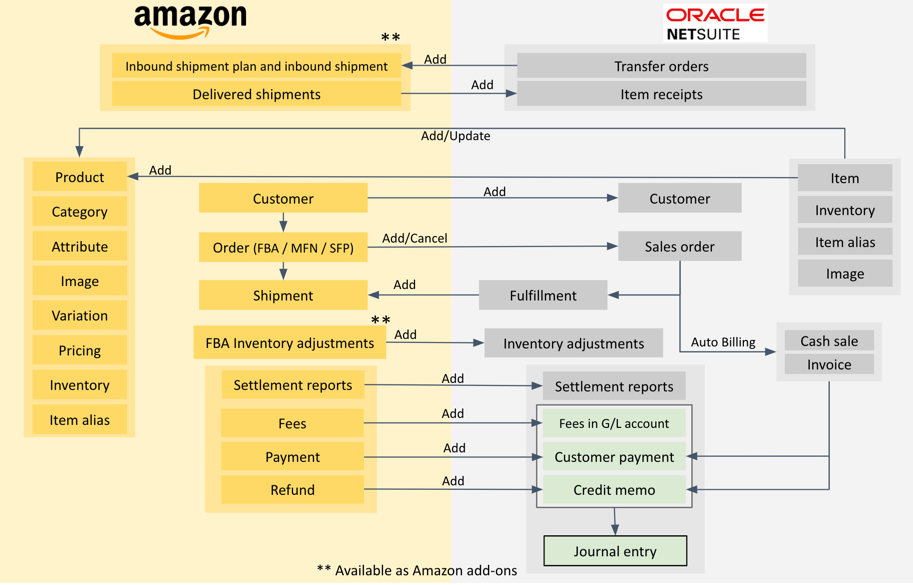Amazon as the world’s biggest e-commerce platform is frequented by millions of sellers and merchants from all niches. Whichever ERP solutions or other legacy software your company is using to run the business, in order to take advantage of the robust Amazon e-commerce platform you need to sync processes and data with their respective Amazon processes.
For smooth business operation, you need to sync data with your existing ERP system and Amazon systems and processes such as Amazon Seller Central, Fulfilment By Amazon (FBA), and Vendor Central. This is where NetSuite as the most well-equipped ERP system with most business-friendly features can really help. NetSuite integration services will help you automate the processes making business operations fast and streamlined and ensuring optimum scalability with the growth of products and traffic.
Sluggish processes can lead to negative customer reviews resulting in a negative impact on Amazon listings. NetSuite integration can help you stay clear of these slow processes and frictions in business processes. Moreover, the NetSuite eCommerce integration will also help your business adhere to the Amazon seller criteria as well.
How The NetSuite Amazon Integration Can Boost Your Revenue?
To become successful in streamlining your back office operation with Amazon Seller Central, the NetSuite ERP system can be tremendously helpful. Any business has the priority of delivering streamlined and smooth customer service while processing correct inventory information and updating the product prices at the Amazon store in real-time.
Orders can be generated from multiple places. Ensure they don’t end up at the same place.
Move all DATA into a SYSTEM.
To fulfil these priorities and needs a smooth integration between Amazon and the NetSuite ERP software used by your business can be immensely effective. Thanks to this integration a business can map out data flow almost without efforts ranging from products, inventory orders, order fulfilment, payments to refunds and cancellations. There are leading NetSuite integration services that can further customise this integration as per your business needs and priorities.
How Does The NetSuite Amazon Integration Work?

Let us now understand with real-world examples how this integration works for Amazon sellers. Suppose, you possess a storefront on Amazon Seller Central. You are also using the NetSuite cloud ERP platform for your business operations. Now your back office staff need to connect data between these two systems to ensure that the data remains in sync. Instead of switching between two platforms, the NetSuite Amazon integration will help you to keep everything streamlined and synced.
Orders, inventory, fulfilment, product information and customer data — keep all these data synced and updated across all your applications through Amazon-NetSuite integration.
As soon as you make changes or additions to the product in NetSuite, the NetSuite Amazon integration created by an experienced NetSuite alliance partner synchronises the changes between Amazon and your NetSuite ERP system. Whenever you get a new order, the order and item information is synced instantly thanks to this integration. Every piece of vital information ranging from the order, total orders, payment method, and tax information are synced between the two systems. The order fulfilment is also synced simultaneously between the NetSuite ERP system and Amazon.
How To Integrate Amazon With NetSuite?
Now that you have a comprehensive understanding of the benefits of NetSuite integration for your Amazon business, it is important to consider the ways you can make this integration happen.
Here below we explain the 3 principal ways to integrate Amazon with NetSuite. Obviously, all of these methods have their equal share of pros and cons, weaknesses and strengths. You can always take the opinions of an experienced NetSuite consulting partner for choosing the right integration solution. Let us explain each of them here below.
Custom-Developed Integration
The custom NetSuite integration development needs considerable skills and technical know-how. This is why it is always advisable to get onboard the most experienced NetSuite partner for custom integration development tasks. Custom integration building involves connecting the NetSuite and Amazon APIs through custom programmes connectors.
The custom-developed NetSuite Amazon integration is preferred by many leading Amazon sellers because of the following benefits.
- The cost of building custom integration is only incurred for once and hence it is cost effective.
- With the right expert resources hired for the task, it may not be as complicated as it appears to be.
- With custom integration you have the highest freedom and you can do whatever you need to do.
Let’s now have a look at the cons of custom NetSuite integration.
- Despite the one time development cost, you obviously need to best the maintenance cost over time as both NetSuite and Amazon platforms continue to evolve.
- Among the three methods we are going to explain here, custom integration is comparatively more complicated than the rest.
- Finding the most technically equipped and experienced developer resources for an emphatic custom integration project can be challenging at times.
Our verdict for the custom integration is positive but we advise you to evaluate the end results against the formidable investment you make for the same. If you cannot fully justify the development cost in comparison to the other two options, you should not opt for this.

App-Based Integration
There are also ready to use apps for such integration. Such app-based integration most of the time is created to cater to a particular function. For instance, such apps can be used for integrating Amazon with NetSuite. With these apps, you can synchronize all data such as products, inventory, orders, fulfilment and customers between the two systems.
The app-based integration works without any hub connecting the two systems. We only have the point-to-point integration here that focuses on fulfilling a particular objective. One of the two connecting systems will be in a master role to handle all kinds of data. The syncing of data happens generally in batches or in several times a day.
These types of solutions usually sync in “batches” meaning every hour or even once or twice a day.
- App based integration is much more affordable and perfectly fits the needs of small businesses with a budget constraint and limited data volume.
- This type of integration will help you capitalise on the streamlined process quickly and reduce the operational pain points in no time.
- If you are a small business with no immediate escalation of growth, app based integration comes as simple, effective and affordable solution.
Now let us have a look at the con factors of app-based integration.
- If your retail business is on a steady growth track, such solutions have several shortcomings and the biggest of them is lack of flexibility.
- When the business needs to add new sales channels or it needs to handle multiple systems, the integration app requires incorporating new connectors.
- When a business is on the fast paced growth track, opting for the app based integration will force you to redo the systems architecture several times.
Our verdict for this type of integration is only positive for the small business scenarios. The typical small retailers having a consistent and constant sales volume over a period of time need only simple single-point integration and for them, the integration app perfectly fits in. For growth-laden retail businesses needing scalability, it is wise to look for other integration solutions.
Integration Platform as a Service (iPaaS)
The integration of Amazon with NetSuite through an iPaaS is basically relying on cloud-hosted middleware that connects NetSuite and Amazon. Among all the integration methods we are discussing here, this happens to be the most popular one.
Let’s have a quick look at the principal pros of iPaaS for integration.
- Generally or in most cases, the iPaaS comes already equipped with connectors for not just Amazon and NetSuite, but also with connectors to integrate a variety of systems such as Payroll, Human Resource, etc.
- In complete contrast to Integration Applications, the iPaaS platforms allows custom configuration so that businesses can bring in custom changes as per their specific requirements.
- iPaaS solutions allows businesses to define rules for movement of data between two systems and thus ensures more control on data transmission.
- iPaaS is highly scalable and businesses can easily update and change the data flow with the growth of their business.
Here are a few cons that go against the iPaaS solution.
- iPaaS among the three integration solutions is comparatively more expensive.
- Because of higher flexibility and integration of multiple systems, iPaaS solutions limit access with a monthly subscription fee.
As for our verdict, one should only opt for an iPaaS integration solution when the business needs scalability to accommodate growth. Any business that wants to keep integration options open for multiple systems will find iPaaS a better solution.
Conclusion
So, automating your Amazon business with appropriate NetSuite integration is not that difficult if you know the ins and outs of the available integration options. You should always choose an integration solution that perfectly accommodates your business requirements and evolving growth scenarios over time.















